Top Rankings
RSU 61/MSAD 61 School District ranks among the top 20% of public school district in Maine for:
Category
Attribute
Community Size
Largest student body (number of students) (Top 1%)
For the 2025 school year, there is 1 public middle school serving 383 students in RSU 61/MSAD 61 School District. This district's average middle testing ranking is 1/10, which is in the bottom 50% of public middle schools in Maine.
Public Middle School in RSU 61/MSAD 61 School District have an average math proficiency score of 70% (versus the Maine public middle school average of 82%), and reading proficiency score of 67% (versus the 85% statewide average).
Minority enrollment is 12% of the student body (majority Hispanic), which is less than the Maine public middle school average of 13% (majority Black and Hispanic).
Overview
This School District
This State (ME)
# Schools
6 Schools
205 Schools
# Students
1,640 Students
54,742 Students
# Teachers
164 Teachers
5,171 Teachers
Student : Teacher Ratio
11:1
11:1
District Rank
RSU 61/MSAD 61 School District, which is ranked within the bottom 50% of all 191 school districts in Maine (based off of combined math and reading proficiency testing data) for the 2021-2022 school year.
The school district's graduation rate of 82% has increased from 70-74% over five school years.
Overall District Rank
#184 out of 222 school districts
(Bottom 50%)
(Bottom 50%)
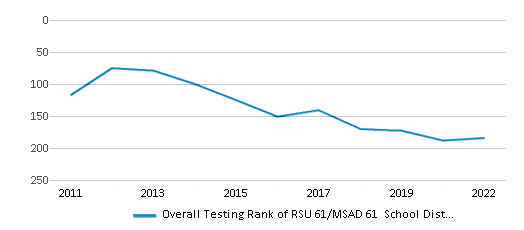
Math Test Scores (% Proficient)
75%
82%
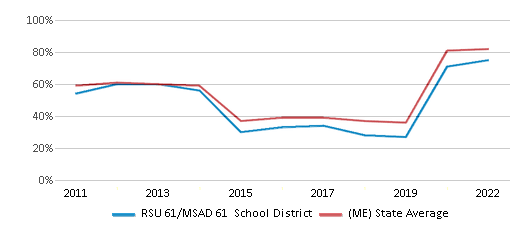
Reading/Language Arts Test Scores (% Proficient)
75%
84%
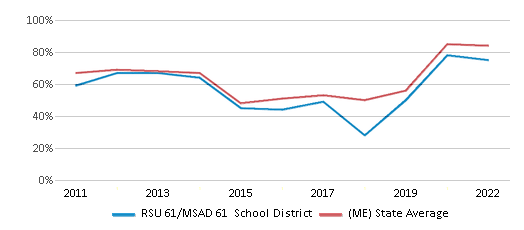
Science Test Scores (% Proficient)
30%
37%
Graduation Rate
82%
86%
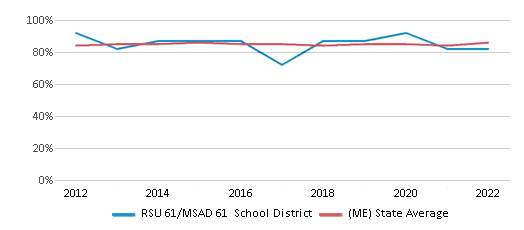
Students by Ethnicity:
Diversity Score
0.18
0.24
# American Indian Students
1 Student
675 Students
% American Indian Students
n/a
1%
# Asian Students
7 Students
618 Students
% Asian Students
n/a
1%
# Hispanic Students
67 Students
1,735 Students
% Hispanic Students
4%
3%
# Black Students
17 Students
1,973 Students
% Black Students
1%
4%
# White Students
1,486 Students
47,794 Students
% White Students
91%
87%
# Hawaiian Students
1 Student
42 Students
% Hawaiian Students
n/a
n/a
# Two or more races Students
61 Students
1,905 Students
% of Two or more races Students
4%
4%
Students by Grade:
# Students in PK Grade:
53
887
# Students in K Grade:
128
1,595
# Students in 1st Grade:
118
1,641
# Students in 2nd Grade:
122
1,729
# Students in 3rd Grade:
90
1,772
# Students in 4th Grade:
117
1,949
# Students in 5th Grade:
110
4,404
# Students in 6th Grade:
131
10,295
# Students in 7th Grade:
122
12,554
# Students in 8th Grade:
130
12,727
# Students in 9th Grade:
143
1,281
# Students in 10th Grade:
139
1,292
# Students in 11th Grade:
124
1,376
# Students in 12th Grade:
113
1,240
# Ungraded Students:
-
-
District Revenue and Spending
The revenue/student of $22,426 is higher than the state median of $21,600. The school district revenue/student has stayed relatively flat over four school years.
The school district's spending/student of $26,050 is higher than the state median of $21,191. The school district spending/student has stayed relatively flat over four school years.
Total Revenue
$37 MM
$3,617 MM
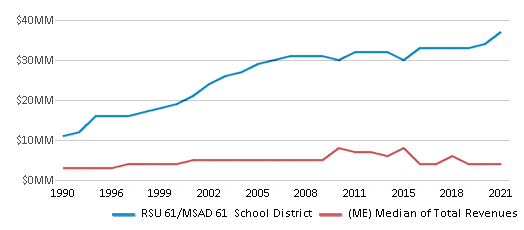
Spending
$43 MM
$3,549 MM
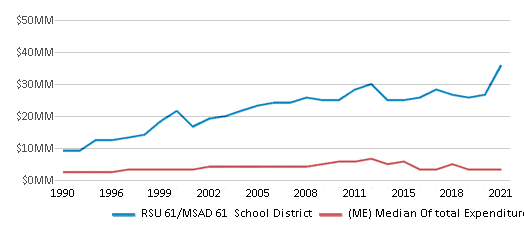
Revenue / Student
$22,426
$21,600
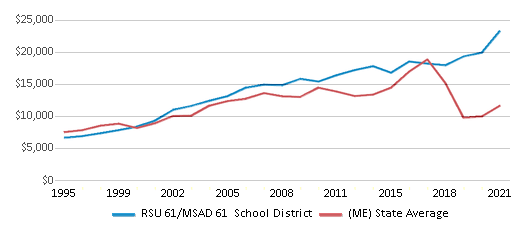
Spending / Student
$26,050
$21,191
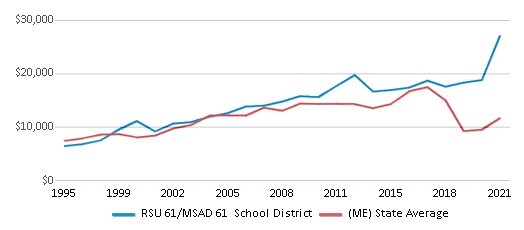
Best RSU 61/MSAD 61 School District Public Middle Schools (2025)
School
(Math and Reading Proficiency)
(Math and Reading Proficiency)
Location
Grades
Students
Rank: #11.
Lake Region Middle School
(Math: 70% | Reading: 67%)
Rank:
Rank:
1/
Bottom 50%10
204 Kansas Road
Naples, ME 04055
(207) 647-8403
Naples, ME 04055
(207) 647-8403
Grades: 6-8
| 383 students
Recent Articles

Year-Round Or Traditional Schedule?
Which is more appropriate for your child? A year-round attendance schedule or traditional schedule? We look at the pros and cons.

Why You Should Encourage Your Child to Join a Sports Team
Participating in team sports has a great many benefits for children, there is no doubt. In this article you will learn what those benefits are.

White Students are Now the Minority in U.S. Public Schools
Increasing birth rates among immigrant families from Asia and Central and South America, combined with lower birth rates among white families, means that for the first time in history, public school students in the United States are majority-minority. This shift in demographics poses difficulties for schools as they work to accommodate children of varying language abilities and socio-economic backgrounds.





